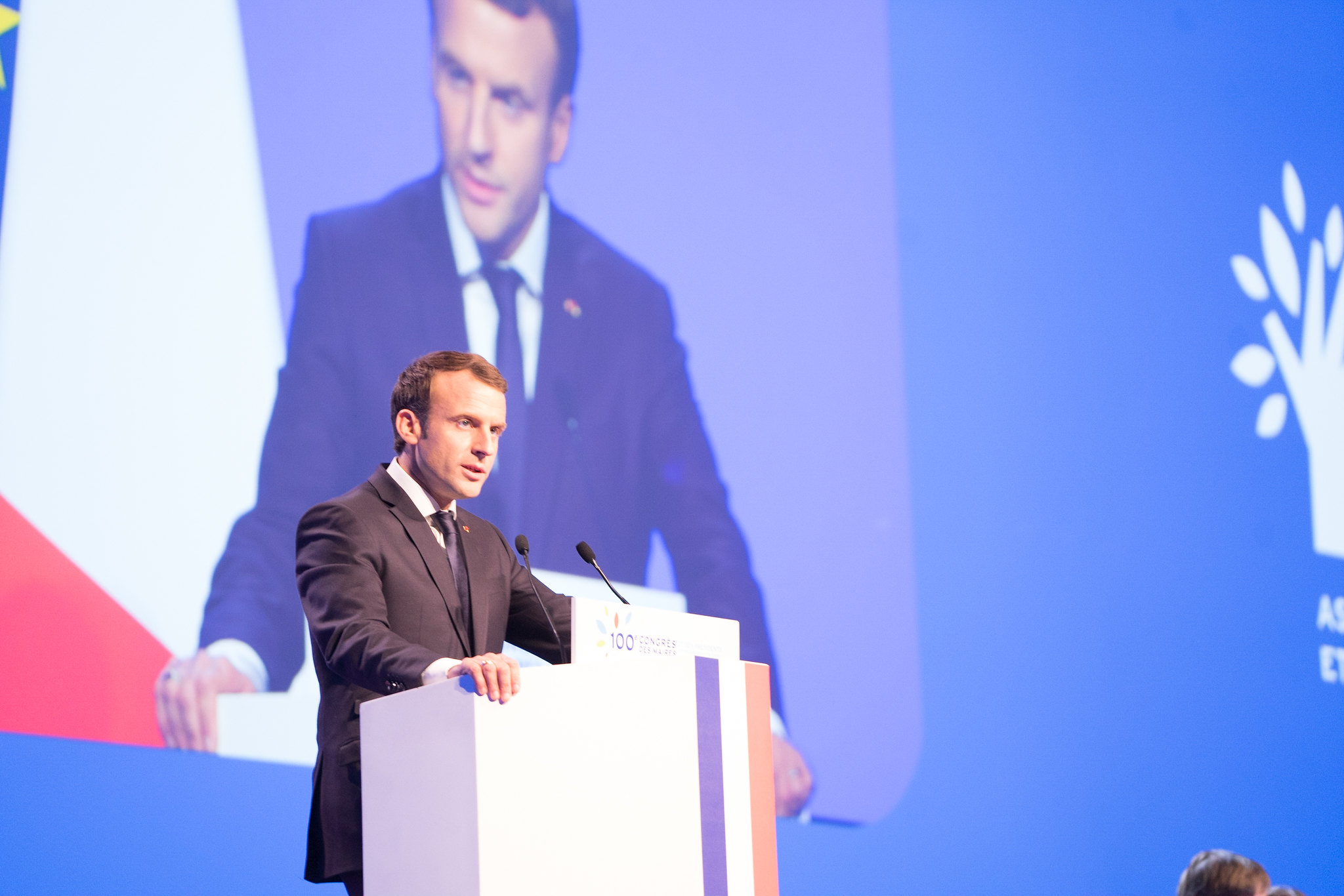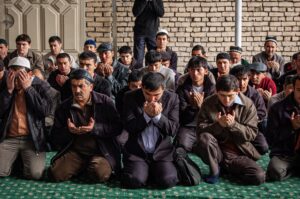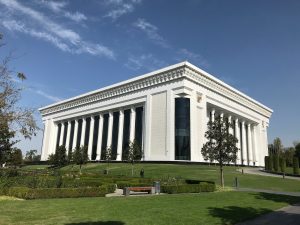
Macron concludes Central Asia charm offensive
French President Emmanuel Macron concluded his two-day tour of Central Asia on Saturday, visiting Kazakhstan and Uzbekistan in a bid to boost France’s strategic and economic interests in the region.
The trip, which coincided with the 30th anniversary of the independence of the former Soviet republics, was seen as an attempt to counter the growing influence of Russia and China in Central Asia, as well as to secure access to critical minerals and energy resources, especially uranium.
France is the world’s largest consumer of nuclear power, which accounts for more than 70 per cent of its electricity generation. Kazakhstan is the world’s top uranium producer, supplying about 40 per cent of France’s needs. Uzbekistan also has significant uranium reserves, ranking seventh globally.
Macron met with the presidents of both countries, Kassym-Jomart Tokayev and Shavkat Mirziyoyev, and signed several agreements and contracts in various sectors, including mining, oil and gas, aerospace, defence, health, education and culture.
In Kazakhstan, Macron praised the country’s “refusal … to take the route of becoming a vassal” of any major power and expressed his support for its “sovereignty” and “stability” amid the geopolitical tensions in the region.
He also announced that France would supply Kazakhstan with advanced air defence radar systems, and that French energy giant EDF was in the running to build the country’s first nuclear power plant. This project will be decided by a referendum later this year.
In Uzbekistan, Macron hailed the country’s “remarkable” reforms and “opening” under Mirziyoyev, who came to power in 2016 after the death of his authoritarian predecessor, Islam Karimov.
He also said that France and Uzbekistan would cooperate on developing renewable energy, especially solar and wind power, and that they would launch a joint satellite project to monitor climate change and natural disasters.
Macron’s visit to Central Asia was the first by a French president since 2010, when Nicolas Sarkozy traveled to Kazakhstan. It also followed a similar tour by German Chancellor Angela Merkel in August, who visited Uzbekistan and Kyrgyzstan.
Both France and Germany are seeking to expand their presence and influence in Central Asia, a region that has long been dominated by Russia and China, but also attracts the interests of other players, such as Turkey, Iran, India and the United States.
Central Asia, which comprises Kazakhstan, Uzbekistan, Kyrgyzstan, Tajikistan and Turkmenistan, is home to about 75 million people and has vast natural resources, such as oil, gas, gold, copper and uranium.
The region is also strategically located at the crossroads of Europe and Asia, and is a key transit route for trade, energy and security.
However, Central Asia also faces many challenges, such as poverty, corruption, human rights violations, environmental degradation, water scarcity, ethnic tensions, religious extremism and terrorism.
Macron said that France was ready to help Central Asia address these issues, and to promote “dialogue” and “cooperation” among the countries of the region and with the European Union.
He also said that France would support the efforts of the Central Asian countries to integrate into the global economy and to diversify their sources of income and development.
Macron’s visit to Central Asia was part of his broader foreign policy agenda, which aims to assert France’s role as a global leader and a defender of multilateralism, democracy and human rights.
He has also visited several other regions and countries in recent months, such as Africa, the Middle East, India, Australia and Japan, where he has sought to strengthen France’s partnerships and alliances, and to advance its interests and values.
Analysis: the West is increasingly invested in Central Asian politics
Macron’s visit to Central Asia was not only a business trip, but also a strategic move to assert France’s role and interests in a region that is undergoing a profound transformation amid the global power competition.
Central Asia, which comprises five former Soviet republics, has long been under the influence of Russia, which considers it as its “near abroad” and a buffer zone against external threats. However, in recent years, Russia’s grip on the region has been challenged by the rise of China, which has invested heavily in infrastructure, trade and security projects under its Belt and Road Initiative (BRI). China is now the largest trading partner and creditor of most Central Asian countries and has also established a military base in Tajikistan, near the Afghan border.
The US, which has been involved in the region since the 9/11 attacks and the war in Afghanistan, has also sought to maintain its presence and influence, especially after the withdrawal of its troops from Afghanistan in August. The US has offered to provide humanitarian and security assistance to the region, and to help it cope with the spillover effects of the Taliban takeover, such as the influx of refugees, the threat of terrorism and the spread of drugs.
Other actors, such as Turkey, Iran, India and Pakistan, have also increased their engagement with Central Asia, driven by their historical, cultural, religious and economic ties, as well as their geopolitical ambitions.
In this complex and dynamic context, France, as a leading European power and a permanent member of the UN Security Council, has sought to enhance its visibility and relevance in Central Asia, and to promote its values and interests.
One of France’s main interests is to secure its access to critical minerals and energy resources, especially uranium, which is essential for its nuclear power industry. France is the world’s largest consumer of nuclear power, which accounts for more than 70 per cent of its electricity generation. Kazakhstan is the world’s top uranium producer, supplying about 40 per cent of France’s needs. Uzbekistan also has significant uranium reserves, ranking seventh globally.
By visiting Kazakhstan and Uzbekistan, Macron aimed to strengthen France’s ties with these key suppliers, and to explore new opportunities for cooperation in the nuclear sector, such as the construction of nuclear power plants, the development of renewable energy, and the launch of a joint satellite project.
Another interest of France is to diversify its sources of energy and to reduce its dependence on Russia, which has been using its energy exports as a tool of political pressure and leverage over Europe. Kazakhstan is now the EU’s third-largest petroleum supplier, after Norway and the US, and also has abundant natural gas reserves. Uzbekistan is also a major gas producer and exporter in the region, and has plans to increase its production and export capacity.
By signing several agreements and contracts in the oil and gas sector, Macron hoped to boost France’s energy security and to support the EU’s efforts to create a common energy market and a green energy transition.
France recognizes the importance of Central Asia as a bridge between Europe and Asia, and as a key player in addressing regional and global issues, such as climate change, terrorism, migration and human rights.
By expressing his respect and support for the independence and territorial integrity of Central Asian countries, Macron sought to counter the growing influence of Russia and China in the region, and to offer an alternative model of cooperation based on mutual interests and values.
Macron’s visit to Central Asia was part of his broader foreign policy agenda, which aims to assert France’s role as a global leader and a defender of multilateralism, democracy and human rights. He has also visited several other regions and countries in recent months, such as Africa, the Middle East, India, Australia and Japan, where he has sought to strengthen France’s partnerships and alliances, and to advance its interests and values.
However, Macron’s Central Asia charm offensive also faces some limitations and challenges. First, France’s engagement with Central Asia is relatively new and modest compared to that of other major powers, such as Russia, China and the US, which have more resources, influence and leverage in the region. France will have to compete with these powers for the attention and cooperation of Central Asian countries, which have their own interests and preferences, and which often balance and hedge among different partners.
Second, France’s cooperation with Central Asia is not without contradictions and trade-offs. For instance, France’s pursuit of energy and economic interests may clash with its promotion of democracy and human rights, as Central Asian countries are ruled by authoritarian regimes that have poor records on these issues. France will have to find a balance between its values and interests and to avoid being seen as hypocritical or opportunistic by the local populations and civil society.
Macron’s partnership with Central Asia is contingent on the regional and global developments and dynamics, which are unpredictable and volatile. For instance, the situation in Afghanistan, which has a direct impact on the security and stability of Central Asia, remains uncertain and fragile, as the Taliban face internal divisions, resistance from other groups, and humanitarian and economic crises. The war in Ukraine, which has escalated the tensions between Russia and the West, also poses a risk of spillover and destabilization in Central Asia, which shares a long border and close ties with Russia.

